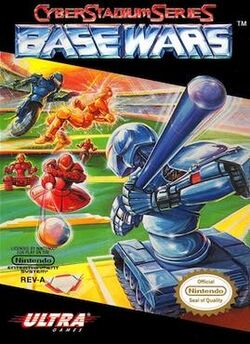Cyber Stadium Series—Base Wars
Topic: Software
 From HandWiki - Reading time: 4 min
From HandWiki - Reading time: 4 min
| Cyber Stadium Series—Base Wars | |
|---|---|
 | |
| Developer(s) | Konami |
| Publisher(s) | Ultra Games |
| Platform(s) | Nintendo Entertainment System |
| Release | May/June 1991 |
| Genre(s) | Sports |
| Mode(s) | |
Cyber Stadium Series—Base Wars is a baseball video game for the Nintendo Entertainment System (NES).
Developed by Konami for the NES, and published by Ultra Games,[1] Cyber Stadium Series—Base Wars[2][3] was released in May[4] or June 1991[5] in the United States; the game did not receive a European release.[6] A baseball video game for one or two players,[7] the ROM cartridge features the ability to save games, whether playing either an individual game or the ten-game pennant race.[8]
In a 24th century where baseball team owners are dissatisfied overpaying their players (e.g. US$2.4 billion per year for a lifetime .250 hitter), they have replaced the athletes with armed robots;[2][1] there are four models of robot to choose from, each optimally suited for specific baseball positions.[8] One of the game's innovations is where upon force plays, the two opposing players fight for possession of the base; another is the ability to upgrade robots' abilities between pennant games.[9] If a team loses three robots in a game (to destruction from incremental damage), they forfeit the game.[10]
Reception
In 1991, across its four 1–5 metrics of "graphics and sound", "play control", "challenge", and "theme and fun", Nintendo Power gave Base Wars an average score of 3.275 (3.6, 3.0, 2.9, and 3.6 respectively).[7] Entertainment Weekly's Bob Strauss rated the game a "B-", primarily penalizing Base Wars for playing too much like a typical baseball video game and not leaning enough into its science-fiction potential.[9] Electronic Gaming Monthly's four reviewers averaged a 7.75/10 rating for the game, positively comparing it to Cyberball and noting its multiplayer mode, variety, and polish.[11] As of February 1992, Funco was offering $26 (equivalent to $58.26 in 2024) to customers selling a copy of Base Wars.[12]
Twelve years after the game's release, HonestGamers gave a score of 3/5,[13] while after a further eleven years, Game Informer placed the "super bizarre, but in all the best ways" game as their number-two weirdest sports game.[10] In 2014, Allgame's 2.5/5-star review—penned by Skyler Miller—was lukewarm, dismissing the combat aspect and describing fielding as "nearly impossible due to a screen that scrolls too slowly to keep up with fast-moving balls".[14]
References
- ↑ 1.0 1.1 "Cyber Stadium Series: BaseWars" (in en). https://www.ign.com/games/cyber-stadium-series-basewars.
- ↑ 2.0 2.1 (in en) How to Play Cyber Stadium Series—Base Wars, Buffalo Grove, Illinois: Ultra Games, 1991
- ↑ Ultra Games (June 1991). Semrad, Ed. ed. "Base Wars" (in en). Electronic Gaming Monthly 4 (6): 2–3. ISSN 1058-918X.
- ↑ "The Complete Game Pak Directory" (in en), Intro Pak, Redmond, Washington: Nintendo of America, p. 4
- ↑ Semrad, Ed, ed (June 1991). "Software Calendar" (in en). Electronic Gaming Monthly 4 (6): 26–27. ISSN 1058-918X.
- ↑ Scullion, Chris (2019). "Licensed Games" (in en). The NES Encyclopedia: Every Game Released for the Nintendo Entertainment System. Great Britain: Pen and Sword Books. p. 30. ISBN 978 1 52673 779 3.
- ↑ 7.0 7.1 Tilden, Gail, ed (April 1991). "Now Playing" (in en). Nintendo Power (Redmond, Washington: Minoru Arakawa) 23: 87–91. ISSN 1041-9551. OCLC 760783416.
- ↑ 8.0 8.1 Douglas, Jim, ed (July 1991). "ACE Games News" (in en). ACE (London) (46): 7–10. ISSN 0954-8076.
- ↑ 9.0 9.1 Strauss, Bob (1991-06-21). "Cyber Stadium Series: Base Wars" (in en). Entertainment Weekly. ISSN 1049-0434. OCLC 21114137. https://ew.com/article/1991/06/21/cyber-stadium-series-base-wars/. Retrieved 2020-06-28.
- ↑ 10.0 10.1 Federspiel, Isaac (2014-02-05). "Top 10 Weird Sports Games" (in en). Game Informer. ISSN 1067-6392. https://www.gameinformer.com/b/features/archive/2014/02/05/top-10-weird-sports-games.aspx. Retrieved 2020-06-28.
- ↑ Semrad, Ed, ed (July 1991). "Review Crew" (in en). Electronic Gaming Monthly 4 (7): 18–26. ISSN 1058-918X.
- ↑ Funco (February 1992). McDermott, LeeAnne. ed. "Swap Your Old Nintendo Games for Cash or New Titles" (in en). GamePro (Redwood City, California) 4: 32–33. ISSN 1042-8658.
- ↑ "Cyber Stadium Series: Base Wars" (in en). https://www.gamerankings.com/nes/587110-cyber-stadium-series-base-wars/index.html.
- ↑ Miller, Skyler. "Cyber Stadium Series: Base Wars" (in en). http://www.allgame.com/game.php?id=278&tab=review.
 KSF
KSF